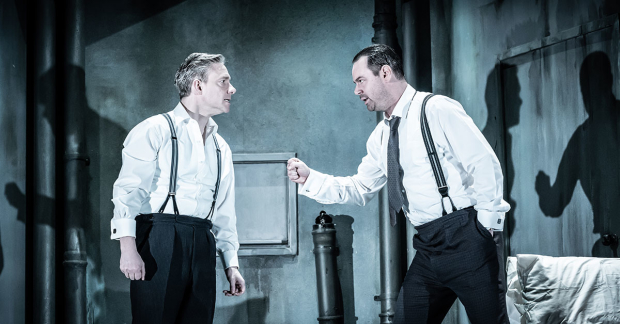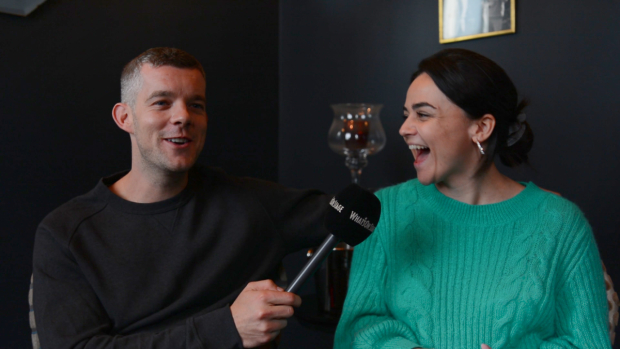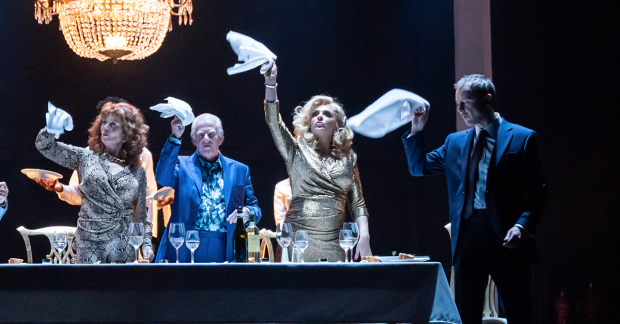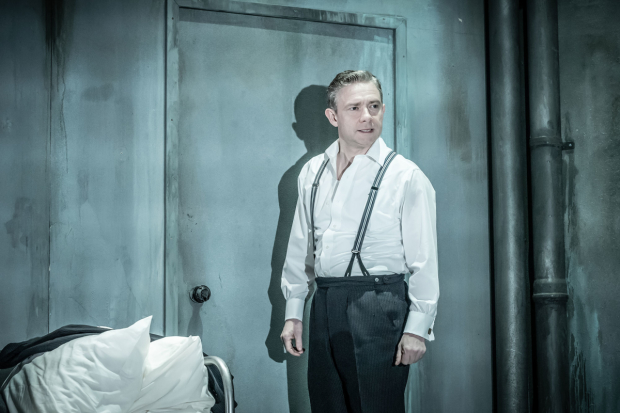Review: Pinter Seven A Slight Ache / The Dumb Waiter (Harold Pinter Theatre)

© Marc Brenner
Danny Dyer has recently attained national treasure status. Martin Freeman is not far behind him. Both have perfect comic timing. And from the moment that the lights go up on Harold Pinter's The Dumb Waiter, you know you are in safe hands.
In long minutes of engrossing silent business, Dyer lies straight on a bed, grumpily trying to read his newspaper, while Freeman fidgets, putting on and taking off his shoes. In Jamie Lloyd's delicately calibrated production, these carefully elaborated stage directions are both tension-building and supremely funny, just like the play itself.
Written in 1957 and first performed in 1960, The Dumb Waiter sets two hitmen – Ben (Dyer) and Gus (Freeman) – in a room where they pass the time waiting for their next job in talking of the trivial, of football and cricket, of Eccles cakes and mouldy biscuits, of putting on the kettle and whether that is the correct phrase. Beneath their words is a nagging anxiety, heightened when the dumb waiter of the title suddenly and absurdly crashes into the room, containing instructions for meals they cannot deliver.
It's a supreme mix of the realistic and the absurd, startling and incongruously comic by turns. Dyer and Freeman seem to understand that in their bones, painting contrasting pictures, Dyer all burly competence but with worry nagging in his hands and the little twitches of his shoulders, Freeman increasingly white and panic-stricken with worry, his eyes darting from side to side seeking reassurance. Dyer's dance of fear when the dumb waiter first slams down is a glory. As is Freeman's delivery of the single word "scampi".
This is the concluding bill of this sensational five-month season of all 20 of Pinter's short plays, which have been played, produced and directed at an astonishing level of skill. The Dumb Waiter is paired with the much less familiar A Slight Ache from 1958. Lloyd makes the most of the fact that this unsettling domestic drama was originally a tale for radio, setting its protagonists Flora (Gemma Whelan) and Edward (John Heffernan) inside a radio booth, complete with microphones and sound effects desk. (Soutra Gilmour is as always responsible for the simple but effective design; George Dennis for the devastating soundscape.)
Their initial conversation, in the clipped accents of the English upper middle-classes, is about the weather and the beautiful flowers in their beautiful garden. But when they kill a wasp that has plunged into the marmalade there is the first hint of the danger lurking in paradise; when they invite a mysterious match seller into their home, dark forces are unleashed. The match seller – whom we never see and who never speaks – is clearly the repository for their hidden passions: for his fears and her desires.
What's astonishing about A Slight Ache is its language, great tumbling lists and paragraphs of familiar words transformed into something rich and strange by the way they are used. And the performances are once again pitch perfect, with Heffernan's rising terror balanced by Whelan's sudden assumption of control.
Watching each of these seven Pinter evenings has been a remarkable experience. Each play has illuminated the others. Themes spring out, as do obsessions – with language itself, with cricket, with lists, even with matches. The image of a striking match is twice present in this double bill, and is a perfect metaphor for the prescient sense that Pinter exhibited from the very beginning, of the unknown darkness outside a small circle of light in which people make their way. It's what makes him so unique, and so timeless; he understood the fear lurking in the shadows better than any other British playwright.
The short plays emphasise that and Lloyd deserves huge praise and acclaim for bringing them together in a season that has been both a treat and a revelation.


















